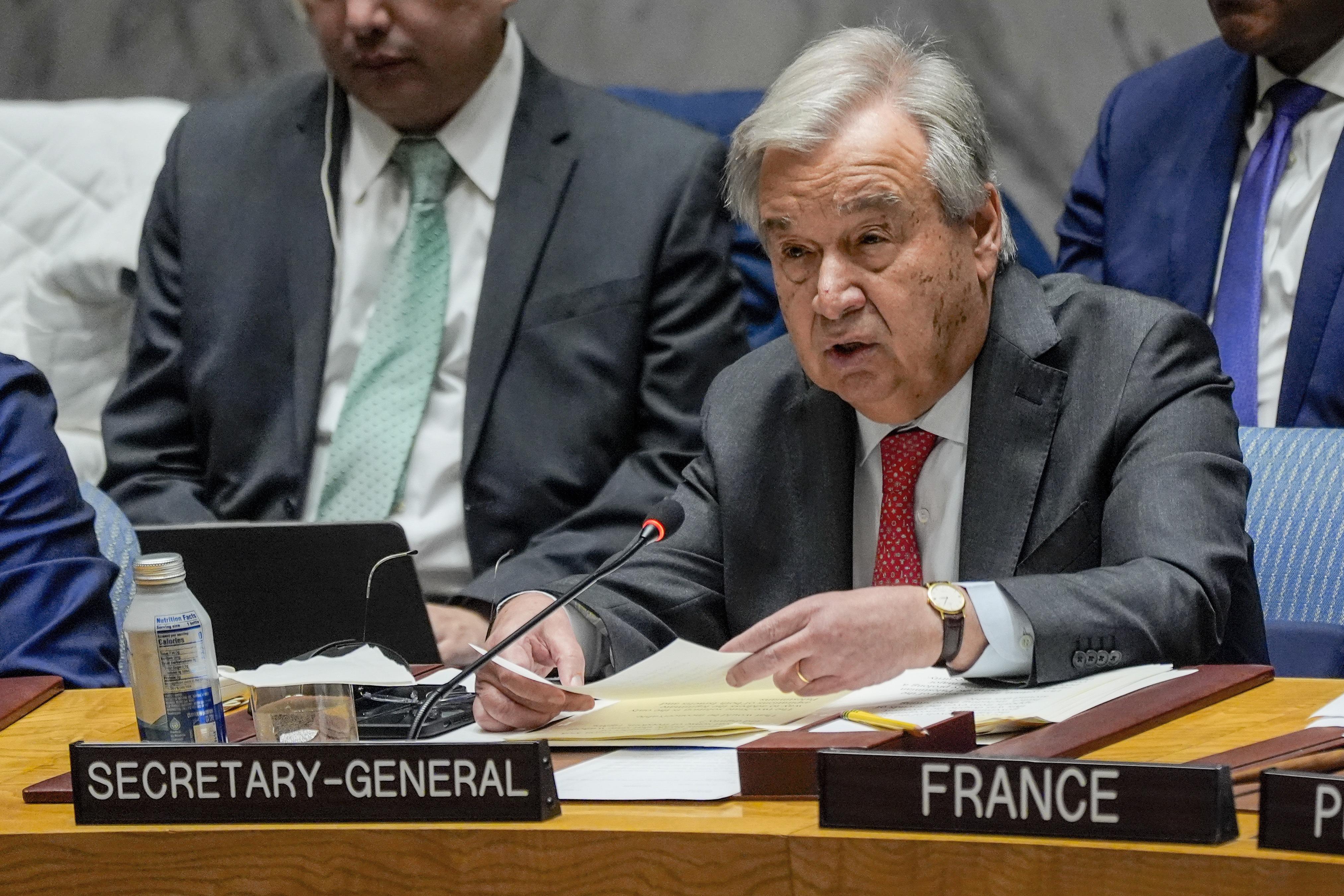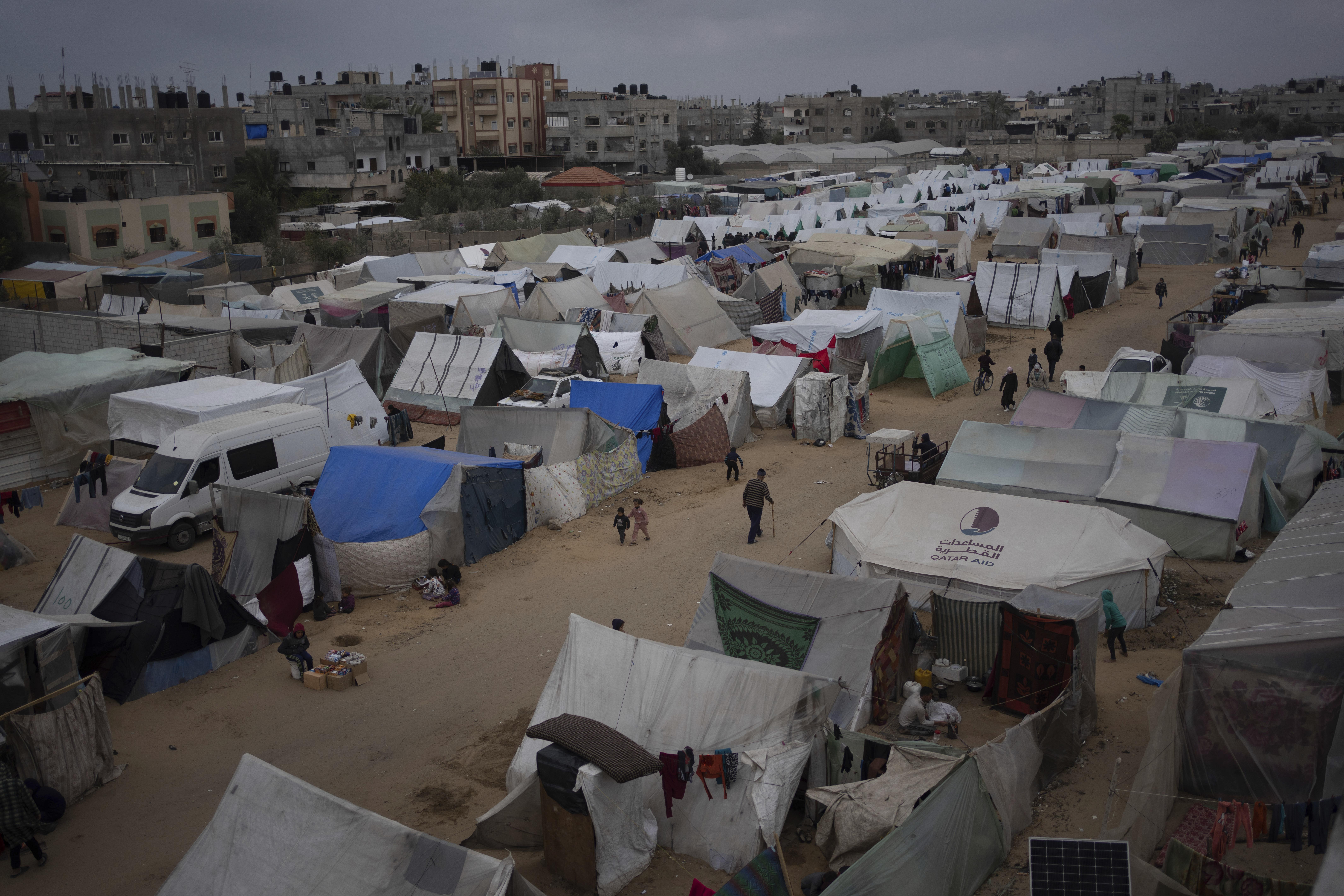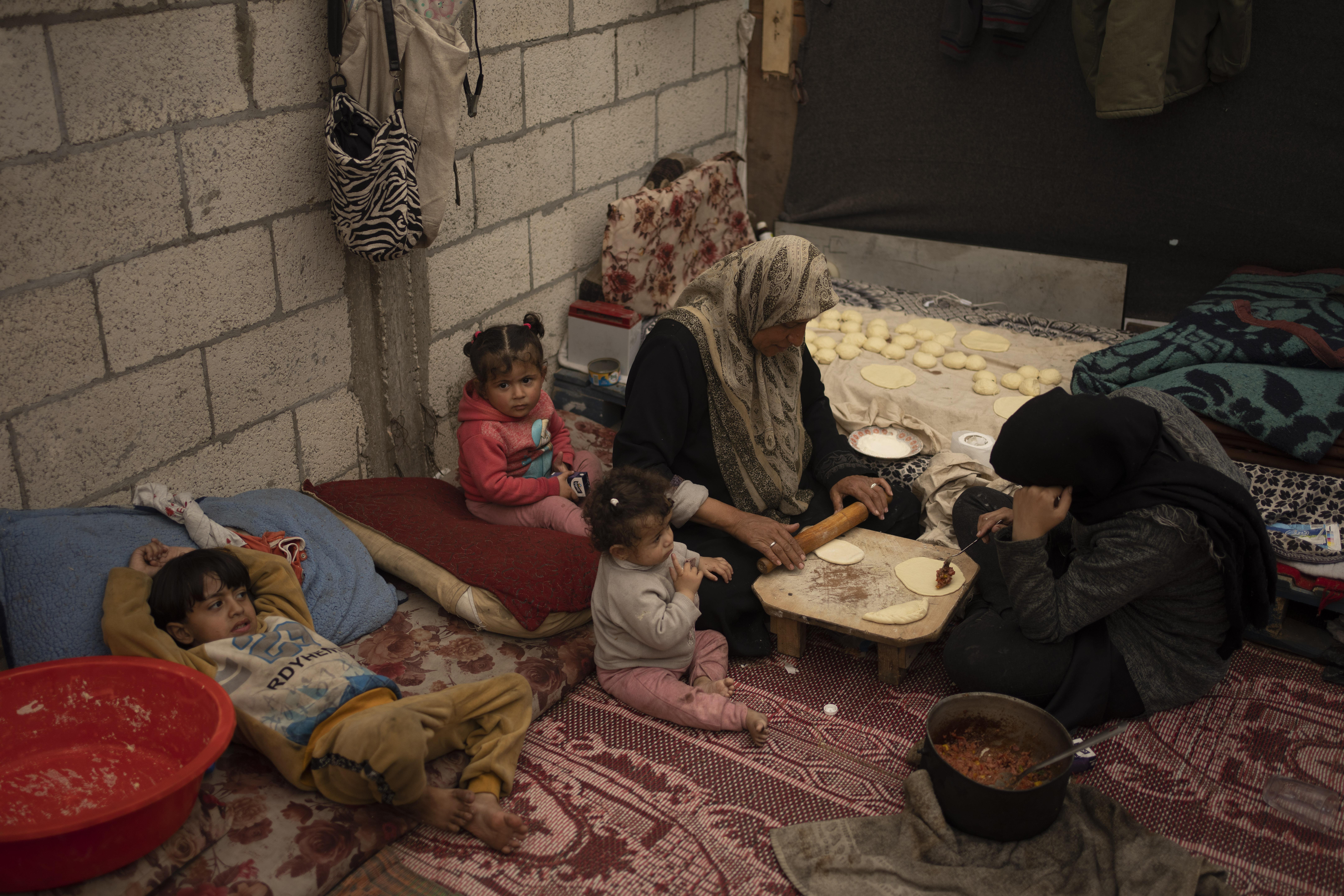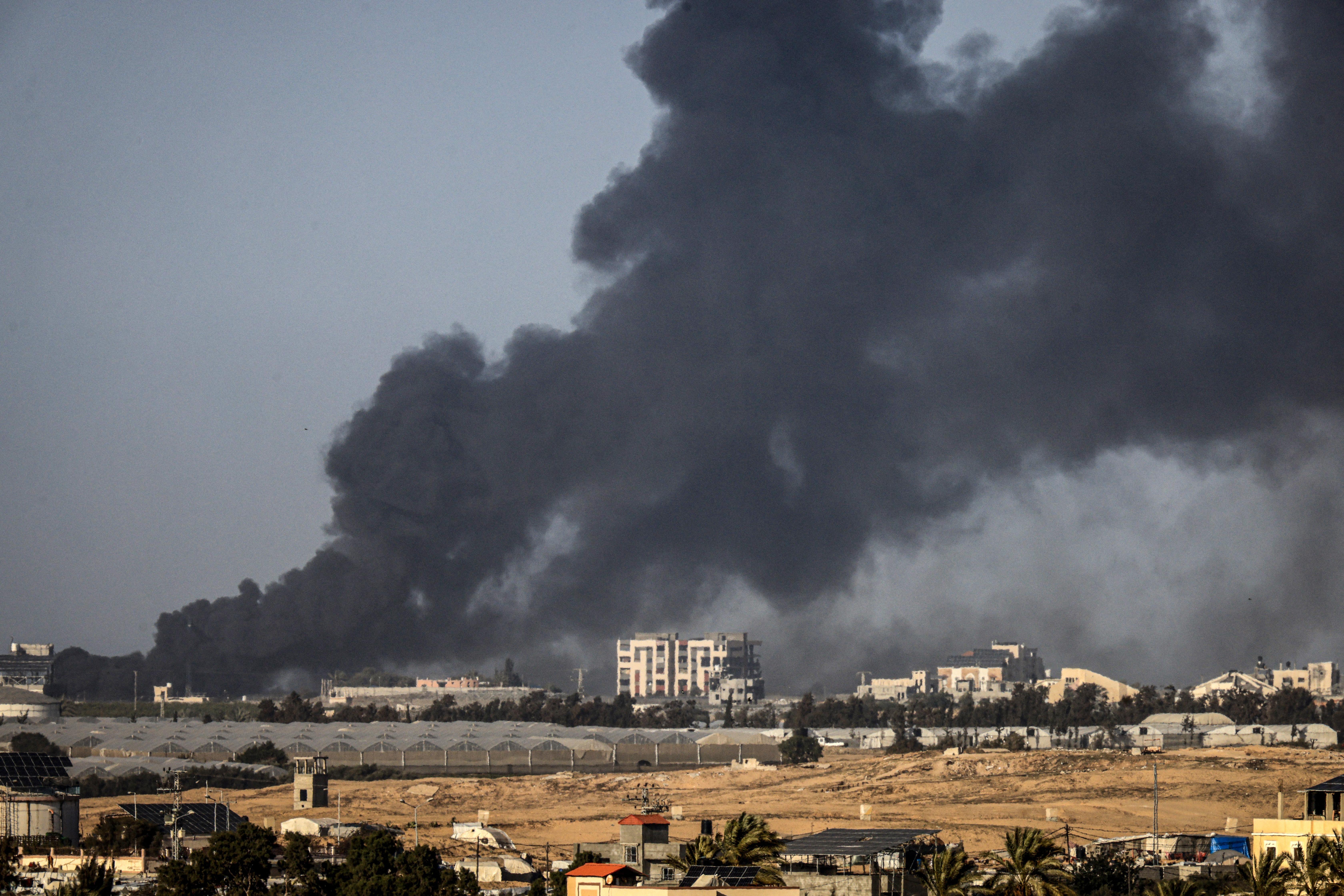 United Nations Secretary-General António Guterres speaks on Jan 23, 2024, at United Nations Headquarters. (PHOTO / AP)
United Nations Secretary-General António Guterres speaks on Jan 23, 2024, at United Nations Headquarters. (PHOTO / AP)
UNITED NATIONS - UN Secretary-General Antonio Guterres stressed Tuesday that a lasting end to the Israeli-Palestinian conflict can only come through a two-state solution.
"Last week's clear and repeated rejection of the two-state solution at the highest levels of the Israeli government is unacceptable," he told a high-level open debate of the Security Council on the Middle East, including the Palestinian question.
The Israeli leadership's rejection of the two-state solution was despite the strongest appeals from even the friends of Israel, including those sitting around the table for the Security Council meeting, he noted.
"This refusal, and the denial of the right to statehood to the Palestinian people, would indefinitely prolong a conflict that has become a major threat to global peace and security. It would exacerbate polarization and embolden extremists everywhere," he warned.
Antonio Guterres said this terrible time for Israelis and Palestinians must spur both parties and the international community to act with courage and determination to achieve a just and lasting peace
The right of the Palestinian people to build their own fully independent state must be recognized by all. And any refusal to accept the two-state solution by any party must be firmly rejected, he said.
READ MORE: Israel sees 24 single-day soldier toll, 'encircles' Khan Younis
"What is the alternative? How would a one-state solution look with such a large number of Palestinians inside without any real sense of freedom, rights and dignity? This would be inconceivable. The two-state solution is the only way to address the legitimate aspirations of both Israelis and Palestinians."
Israelis must see their legitimate needs for security materialized, and Palestinians must see their legitimate aspirations for a fully independent, viable and sovereign state realized, in line with UN resolutions, international law and previous agreements. Israel's occupation must end, said Guterres.
"The role of the international community is clear," he said. "We must unite to support Israelis and Palestinians to take determined actions to advance a meaningful peace process."
READ MORE: EU's Borrell: Israeli plan to destroy Hamas not working
Over recent decades, the two-state solution has been traduced, undermined and left for dead many times. However, it remains the only way to achieve durable and equitable peace in Israel, in Palestine, and in the region. As the events of the past three months have shown, it is also the only way to avoid endless cycles of fear, hatred and violence. This terrible time for Israelis and Palestinians must spur both parties and the international community to act with courage and determination to achieve a just and lasting peace, he said.
 Palestinians displaced by the Israeli ground offensive on the Gaza Strip walk at the makeshift tent camp in Rafah on Jan 23, 2024. (PHOTO / AP)
Palestinians displaced by the Israeli ground offensive on the Gaza Strip walk at the makeshift tent camp in Rafah on Jan 23, 2024. (PHOTO / AP)
Immediate ceasefire urged
Guterres also called for an immediate humanitarian ceasefire in Gaza.
"I renew my appeal for an immediate humanitarian ceasefire. This will ensure sufficient aid gets to where it is needed, facilitate the release of hostages, and help lower tensions around the Middle East," he said.
No effective humanitarian aid operation can function under the conditions that have been forced on Palestinians in Gaza and on the humanitarian workers, he said.
ALSO READ: At least 30 killed in Israeli bombing on southern Gaza
Humanitarian delivery is not an exercise of counting trucks. It is about ensuring the right volume and quality of assistance reaches people in need. To be able to do its work, the United Nations needs to see a set of operational requirements met, said Guterres.
I call for rapid, safe, unhindered, expanded and sustained humanitarian access throughout Gaza. I repeat my call for an end to all violations of international humanitarian law.
Antonio Guterres, UN Secretary-General
"We need safety. We are operating in a war zone. The current humanitarian notification mechanisms do not offer any real confidence for operations and planning humanitarian responses. A number of serious incidents have shown how these essential mechanisms need to be substantially improved. Safety also entails reliable and cleared roads inside Gaza, and unimpeded crossings at checkpoints.
"We need to be equipped to do our job. This includes telecommunications equipment, so convoys can communicate with each other; armored vehicles and protective gear, given the ongoing hostilities and the widespread contamination with explosive remnants of war; far greater logistical capacity; spare parts for infrastructure such as desalination plants, and other critical humanitarian items," he said.
ALSO READ: 21 Israeli troops dead in Gaza attack as fighting rages
There is also a need for more crossing points into Gaza to reduce congestion and avoid chokepoints. Humanitarian access to northern Gaza is lacking. In the first two weeks of January, out of 29 planned humanitarian missions to deliver life-saving supplies north of Wadi Gaza, only seven were accomplished, fully or partially. The majority of missions were denied access by Israel. After over 100 days of operations in the north, insecurity and fighting has continued, he said.
 Palestinians displaced by the Israeli ground offensive on the Gaza Strip cook at the makeshift tent camp in Rafah on Jan 23, 2024. (PHOTO / AP)
Palestinians displaced by the Israeli ground offensive on the Gaza Strip cook at the makeshift tent camp in Rafah on Jan 23, 2024. (PHOTO / AP)
"I call for rapid, safe, unhindered, expanded and sustained humanitarian access throughout Gaza. I repeat my call for an end to all violations of international humanitarian law," said Guterres.
The humanitarian situation in Gaza is appalling, he said.
With winter bearing down, 2.2 million Palestinians in Gaza face inhumane, squalid conditions, struggling to simply make it through another day without proper shelter, heating, sanitary facilities, food, and drinking water. Everyone in Gaza is hungry. A quarter of Gaza's population -- more than half a million people -- are grappling with catastrophic levels of food insecurity, he said.
READ MORE: Israeli, Palestinian ministers to attend EU peace meeting
Meanwhile, nearly 1.5 million people are now crammed inside Rafah governorate. Disease is spreading as the health system collapses. Only 16 of Gaza's 36 hospitals are even partly functional. That means the people of Gaza not only risk being killed or injured by relentless bombardments, they also run a growing chance of contracting infectious diseases, he said.
Spillover risks of Gaza conflict
Guterres also warned of the spillover risks of the conflict in Gaza, saying that war and misery in the enclave are fueling turmoil far beyond.
"We are seeing dangerous developments across the occupied West Bank, including East Jerusalem, where tensions are off the charts, with a dramatic increase in casualties," he said.
ALSO READ: Yemen's Houthis order UN staff from US, UK to leave in 1 month
Dozens of Palestinians are being arrested daily. Over 6,000 Palestinians were detained since Oct 7, with many subsequently released. Settler violence is also another major concern. The demolition and seizure of Palestinian-owned houses and other structures continue, he noted.
 A picture taken from Rafah shows smoke billowing over Khan Yunis in the southern Gaza Strip during Israeli bombardment on Jan 22, 2024. (PHOTO / AFP)
A picture taken from Rafah shows smoke billowing over Khan Yunis in the southern Gaza Strip during Israeli bombardment on Jan 22, 2024. (PHOTO / AFP)
The risk of miscalculation is dangerously high. I urge all parties to refrain from aggressive rhetoric, and to immediately end activities that could further inflame tensions.
Antonio Guterres, UN Secretary-General
The Palestinian economy is in crisis. Israel's withholding of a significant portion of Palestinian tax revenues, the continued prohibition on nearly all Palestinian workers entering Israel since Oct 7, and severe movement and access restrictions across the West Bank are all contributing to soaring unemployment and poverty, he said.
The risks of broader regional escalation are now becoming a reality, warned Guterres.
Daily exchanges of fire across the Israeli-Lebanese border, including strikes on civilian areas, have killed six Israelis and 25 Lebanese civilians and driven tens of thousands from their homes on both sides, he said. "The risk of miscalculation is dangerously high. I urge all parties to refrain from aggressive rhetoric, and to immediately end activities that could further inflame tensions."
READ MORE: US, UK forces launch new strikes on Houthi targets in Yemen
The situation in the Red Sea is also deeply worrying, said the UN chief.
"Deescalation is essential, and all attacks on merchant and commercial vessels in the Red Sea must cease immediately."
"I urge all parties to step back from the brink and to consider the horrendous human cost of a regional conflict," the UN chief added.
Beyond the need for immediate deescalation, each situation demands the implementation of a clear political roadmap that would contribute to long-term regional stability, he said.
ALSO READ: Israel approves plan to hold Gaza frozen funds through Norway
In Syria, that is a UN-facilitated political solution in line with Security Council Resolution 2254 that meets the needs of all Syrians; on the Israeli-Lebanonese border, the need for the full implementation of Security Council Resolution 1701; and in Yemen, the establishment of a UN roadmap to implement the commitments made by the parties and prepare for a Yemeni-owned, inclusive political process under UN auspices, said Guterres.


